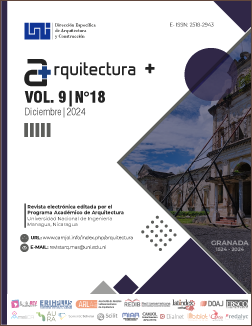Urban reconversion of Mexico City due to the economic crisis of COVID 19 or due to a process of financialization?
DOI:
https://doi.org/10.5377/arquitectura.v9i18.19096Keywords:
COVID 19, financiarización, gentrificación, reconversión-urbana, vivienda-en-la-CDMX.Abstract
The COVID 19 pandemic forced the closure of sources of work and evidenced the precarious situation of the economic income of Mexican families, causing the loss of rental or mortgage housing and exposing, as a secondary effect, the public policies that regulated the urban growth of Mexico City (CDMX). Even though the central government of the city published in 2022 the "Agreement for the conversion of offices to housing in Mexico City", there is still the displacement of 100 thousand inhabitants per year who are unable to obtain a habitable space (Cruz, 2024). The reconversion of land uses, housing production, and regulatory schemes that contribute to legal construction in the city have only facilitated the construction of 1.25% of the 300 thousand units that are required per year (Díaz, 2022) and that cannot be acquired by the 30% of the population living in extreme poverty. With an incessant construction process and with the highest trade index (supply and demand) in the country, the cost of land and construction is becoming more expensive; so the large real estate developers are not considering the vulnerable social classes as their commercial objective and see a means of investment of financial assets that does not solve the habitable problems of the city and that derives, inevitably, in a process of financialization. The introduction of national and foreign private investments under the neoliberal competitiveness scheme benefits the intensification of the activity of the real estate market, both in housing and in the peripheral areas that urbanize them, causing social gentrification that ultimately prevents the population from recovering its living space.
Downloads
1095
References
Aragón, S. (2021) Se perdieron 218 mil empleos por la pandemia del COVID 19. Congreso de la Ciudad de México. Recuperado el 30 de agosto de 2024. https://congresocdmx.gob.mx/comsoc-perdieron-218-mil-empleos-formales-consecuencia-pandemia-reconoce-soledad-aragon-secretaria-trabajo-y-fomento-al-empleo-cdmx-1797-1.html#:~:text=Se%20perdieron%20218%20mil%20empleos,al%20Empleo%20de%20la%20CDMX
Azuela de la Cueva, A., Emanuelli, M. S., & Murillo López, S. C. (2021). Sondeo sobre la situación de las personas que residían en viviendas rentadas. Instituto de Investigaciones Sociales UNAM. Recuperado el 30 de agosto de 2024. https://www.iis.unam.mx/wp-content/uploads/2022/01/Reporte-Viviendas-Rentadas-Rev2-131221.pdf
Constitución Política de la Ciudad de México [C.P. CDMX.], reformada, Gaceta Oficial de la Ciudad de México [G.O.CDMX.], 24 de Marzo de 2023, (México).
Cruz Flores, A. (2024). Expulsa CDMX a 100 mil personas al año. La Jornada. Recuperado el 30 de agosto de 2024. https://www.jornada.com.mx/noticia/2024/04/28/capital/expulsa-cdmx-a-100-mil-personas-al-ano-por-falta-de-vivienda-5753
Delgadillo, V. (2021). Financiarización de la vivienda y de la (re) producción del espacio urbano. Revista INVI, 36(103), 1-18. https://doi.org/10.4067/S0718 83582021000300001
Delgadillo, V. (2022). Gentrificación y financiarización del desarrollo urbano en la Ciudad de México. Revista Electrónica de Geografía y Ciencias Sociales Universitat de Barcelona. https://revistes.ub.edu/index.php/ScriptaNova/article/view/40083
Díaz, O. (2022). CDMX olvida construir opciones de vivienda para 50 mil familias. Publimetro. Recuperado el 30 de agosto de 2024. https://www.publimetro.com.mx/noticias/2022/01/23/cual-es-la-demanda-de-vivienda-en-la-cdmx/#:~:text=23%20de%20enero%202022%20a,es%20decir%2C%20un%2016.6%25.
El Universal. (2022, 24 de marzo). Anuncian 9 proyectos para reconversión de oficinas a viviendas en CDMX. El Universal. Recuperado el 30 de agosto de 2024. https://www.eluniversal.com.mx/metropoli/anuncian-9-proyectos-para-reconversion-de-oficinas-viviendas-en-cdmx/
Escobar, S. (2023). Vivienda económica y social. El Economista. Recuperado el 30 de agosto de 2024. https://www.eleconomista.com.mx/econohabitat/Vivienda-economica-y-social-aquella-que-casi-no-se-construye-concentra-80-de-la-demanda-en-Mexico-20231022-0010.html
Escobar, S. (2024). Se avecina una mayor inflación en vivienda vertical. El Economista. Recuperado el 30 de agosto de 2024. https://www.eleconomista.com.mx/econohabitat/Se-avecina-mayor-inflacion-en-vivienda-vertical-por-falta-de-nuevo-inventario-20240822-0137.html
Gaceta Oficial de la Ciudad de México. (2022, 22 de marzo). Acuerdo para la reconversión de oficinas a vivienda en la CDMX. Gaceta Oficial de la Ciudad de México. (México).
Gaceta Oficial de la Ciudad de México. (2022, 11 de agosto). Acuerdo por el que se otorgan facilidades administrativas para la ejecución inmediata de proyectos de construcción para vivienda. Gaceta Oficial de la Ciudad de México. (México).
García, A.K. (2024). Canasta básica de alimentos encarece 2.7% en abril. El Economista. Recuperado el 30 de agosto de 2024. https://www.eleconomista.com.mx/economia/Canasta-basica-de-alimentos-encarece-5.7-en-abril-Cuanto-costo-en-cada-region-20240514-0012.html
González Alcántara, J. (2020). En ocho años, CDMX perdió 18.7 Km2 de áreas verdes. IBERO Ciudad de México. Recuperado el 30 de agosto de 2024. https://ibero.mx/prensa/estudio-en-ocho-anos-cdmx-perdio-187-km2-de-areas-verdes-centrus
Instituto Nacional de Vivienda, (INVI). (2024, 8 de noviembre). Suelo y reserva territorial. Recuperado el 8 de noviembre de 2024, de http://invi.df.gob.mx/portal/pdf/Panel_4_II_Suelo_y_Reserva_Territorial.pdf
Ley del Mercado de Valores, [L.M.V.], Reformada, Diario Oficial de la Federación [D.O.F], 24 de Enero de 2024, (México).
Revista Expansión. (2023, 19 de septiembre). ¿Cuánto se gana trabajando en la CDMX? Revista Expansión. Recuperado el 30 de agosto de 2024, de https://expansion.mx/economia/2023/09/19/cuanto-se-gana-en-la-cdmx-sueldo-promedio
Secretaría de Desarrollo Urbano y Vivienda, [SEDUVI]. (2024, 8 de noviembre). Impulsa SEDUVI reactivación económica en el sector de la construcción y la vivienda incluyente. Secretaría de Desarrollo Urbano y Vivienda (SEDUVI). Recuperado el 8 de noviembre de 2024, de https://www.seduvi.cdmx.gob.mx/comunicacion/nota/impulsa-seduvi-reactivacion-economica-en-el-sector-de-la-construccion-y-la-vivienda-incluyente.
Piza Fontes, M. L, Fontenelle_Weber, A, Ungaretti, D. & Valencia, N. (2022). Planificación urbanística en tiempos de pandemia. Naciones Unidas CEPAL. Recuperado el 30 de agosto de 2024. https://repositorio.cepal.org/entities/publication/3d62c0c5-574a-4554-8159-6715231c42de
Wong, A.P. & Rangel, A. (2024). ¿Un tope al aumento de rentas en CDMX?. Milenio. Recuperado el 30 de agosto de 2024. https://www.milenio.com/politica/iniciativa-de-regulacion-de-rentas-en-cdmx-es-aprobada-en-lo-general
Downloads
Published
How to Cite
Issue
Section
License
Copyright (c) 2024 Universidad Nacional de Ingeniería

This work is licensed under a Creative Commons Attribution-NonCommercial-NoDerivatives 4.0 International License.



















